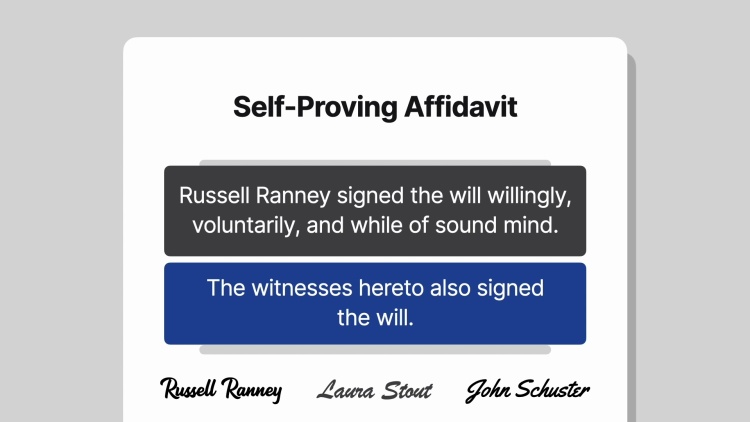In re Will of Ranney
New Jersey Supreme Court
124 N.J. 1, 589 A.2d 1339 (1991)

- Written by Christine Raino, JD
Facts
Russell G. Ranney signed the fourth page of his will in the presence of his wife, Betty (objector), two witnesses and a notary. Immediately after witnessing Ranney sign his will, the two witnesses and the notary signed a self-proving affidavit on the fifth page. The affidavit confirmed Russell’s knowing and willing execution of his will and stated that the witnesses had “signed the Will as witnesses.” The affidavit the witnesses signed did not follow the form of self-proving will provided under N.J.S.A. 3B:3‑4, which integrates the attestation clause of the will into the self-proving affidavit. Instead, the witnesses signed an affidavit that followed the form set out in N.J.S.A. 3B:3‑5, which is a separate document from the will to be signed subsequent to the valid execution of the will. Consequently, the witnesses signed only the affidavit and not the will, as required by N.J.S.A. 3B:3‑2. Russell’s will devised the residue of his estate in trust to Betty, his attorney, and his son-in-law, Henry Bass (proponent). The will also devised the trust income, in thirty-two percent shares, as well as equal shares in the net income from the Ransco Corporation, to Betty and Russell’s two children, Harland Ranney (proponent) and Suzanne Bass (proponent) and the remaining four percent to Betty’s daughter, Nancy Orlow. Betty also received a life estate in certain real property interests. Upon Betty’s death, the real property interests would pass to the Ranney School. Similarly, Betty’s interest in the net income from the Ransco Corporation would pass on her death to Harland Ranney and Suzanne Bass, and on their deaths to the Ranney School. Harland Ranney, Suzanne Bass, Henry Bass and the Ranney School sought admission of the will to probate and Betty opposed probate, claiming the will did not comply with statutory formalities because the witnesses did not sign the will. The Monmouth County Surrogate Court admitted the will to probate and the Appellate Division affirmed, holding that the signatures on the affidavit constituted signatures on the will.
Rule of Law
Issue
Holding and Reasoning (Pollock, J.)
What to do next…
Here's why 907,000 law students have relied on our case briefs:
- Written by law professors and practitioners, not other law students. 47,100 briefs, keyed to 996 casebooks. Top-notch customer support.
- The right amount of information, includes the facts, issues, rule of law, holding and reasoning, and any concurrences and dissents.
- Access in your classes, works on your mobile and tablet. Massive library of related video lessons and high quality multiple-choice questions.
- Easy to use, uniform format for every case brief. Written in plain English, not in legalese. Our briefs summarize and simplify; they don’t just repeat the court’s language.





